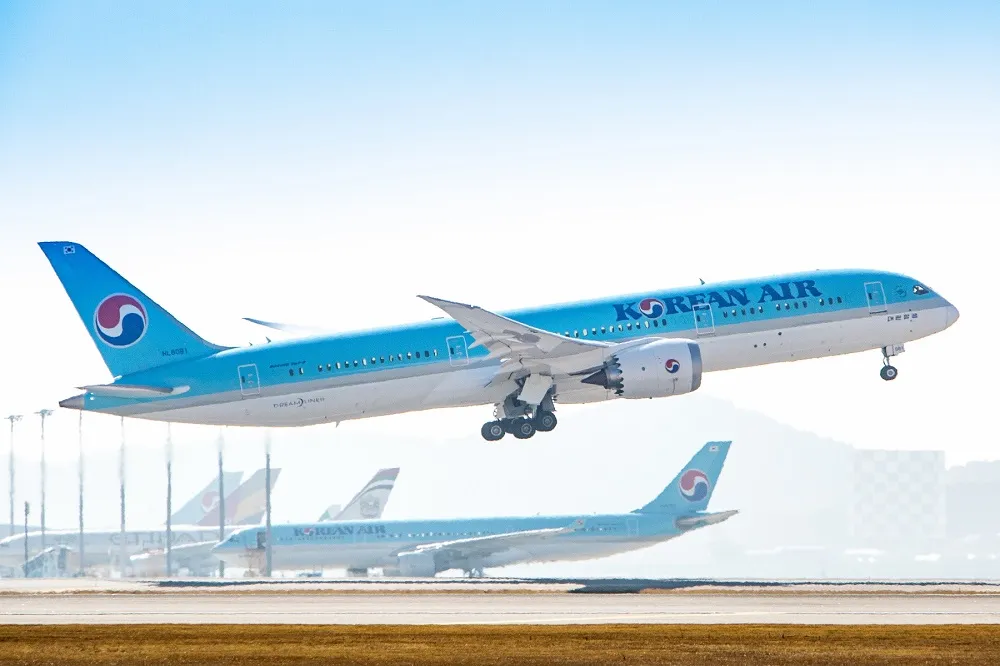
Korean Air to buy rival Asiana in market revamp
Nov 16, 2020

Korean Air has announced plans to acquire its rival, Asiana Airlines, as part of a strategic move to consolidate its position in the competitive airline industry. The acquisition aims to create a more robust carrier capable of navigating the challenges posed by market fluctuations and the ongoing recovery from the pandemic's impact on air travel. By merging operations, Korean Air seeks to enhance its service offerings, expand its route network, and achieve greater operational efficiencies. This bold step reflects a broader trend of consolidation in the aviation sector, as airlines look to strengthen their market presence and improve financial stability.
The airline industry is witnessing a significant transformation as "Korean Air" has announced its intentions to acquire its rival "Asiana Airlines". This strategic move is poised to reshape the aviation landscape in South Korea and beyond, enhancing competitiveness and streamlining operations. In this article, we will delve into the details of this acquisition, its implications for the market, and how it affects consumers and stakeholders alike.
The Acquisition: Key Details
Korean Air's acquisition of Asiana Airlines is not just a routine business transaction; it represents a major shift in the South Korean aviation market. Here are some critical details regarding this acquisition:
| Details | Information |
|---|---|
| Acquirer | Korean Air |
| Target | Asiana Airlines |
| Deal Value | Approximately $1.6 billion |
| Expected Completion | By 2024 |
| Regulatory Approval | Pending |
This acquisition is set against a backdrop of a recovering airline industry that is still grappling with the effects of the COVID-19 pandemic. By consolidating operations, Korean Air aims to bolster its market position and offer enhanced services to its customers.
Market Implications
The merger of "Korean Air" and "Asiana Airlines" is expected to have far-reaching implications for the aviation market. Here are some key areas of impact:
- Increased Market Share: The combined entity will command a significant share of the South Korean aviation market, potentially reducing competition and leading to higher prices.
- Operational Efficiency: The merger is expected to streamline operations, reduce redundancy, and allow for more efficient fleet management.
- Expanded Route Network: Passengers can expect an expanded network of routes and destinations, offering more choices for travel.
- Job Losses: While the merger aims for efficiency, there may be job redundancies leading to potential layoffs within the combined workforce.
Impact on Consumers
The merger will undoubtedly affect consumers in various ways. Here are some potential outcomes:
| Consumer Impact | Details |
|---|---|
| Pricing | As competition reduces, fares may increase, impacting affordability. |
| Service Quality | The merger may lead to improved service quality as resources are pooled. |
| Loyalty Programs | Changes to frequent flyer programs may occur, affecting loyal customers. |
| Flight Options | Passengers may enjoy a broader selection of flights and connections. |
Consumers will need to remain vigilant as the details of the merger unfold. While the potential for improved services is promising, the risk of increased fares cannot be overlooked.
Regulatory Scrutiny
Any merger of this magnitude will attract significant regulatory attention. South Korea's "Fair Trade Commission" and other international regulatory bodies will likely examine the deal to assess its impact on competition. Key regulatory considerations include:
- Market Dominance: Will the merger create a monopoly or reduce competition in the market?
- Consumer Welfare: How will the merger impact consumers in terms of pricing and service quality?
- International Implications: What effect will this merger have on international flights and partnerships?
Future Outlook
The future of the combined Korean Air and Asiana Airlines entity looks promising yet complex. As the industry evolves, the success of this merger will depend on various factors, including:
| Factor | Importance |
|---|---|
| Integration Strategy | A well-executed integration strategy will be crucial for realizing synergies. |
| Customer Retention | Maintaining existing customer loyalty will be vital to ensuring long-term success. |
| Regulatory Approval | Securing necessary approvals will be a significant hurdle that must be overcome. |
| Market Recovery | How quickly the airline industry recovers post-pandemic will impact overall performance. |
The acquisition of Asiana Airlines by Korean Air marks a pivotal moment in the aviation industry. As stakeholders navigate this transition, the focus will remain on maintaining competitive practices while enhancing service quality. For consumers and the market alike, this development signifies a new era in South Korea's aviation landscape.
Related Articles

Explore Thailand: The Best Islands to Visit for Paradise, Adventure, and Relaxation

The Ultimate Guide to the Best Islands in Thailand for Your Next Getaway

Do babies need passports? How to get a passport for a newborn

How to get a U.S. passport fast: here’s how to expedite the process

What is Mobile Passport Control: 5 reasons why you should use it

SENTRI vs. Global Entry: A detailed guide

Do you need a passport to go to the Bahamas? Let’s find out

Do you need a passport to go to Mexico? A detailed guide

Do you need a passport to go to Canada? We got the answer

Do You Need a Passport for a Cruise: An Essential Travel Guide

Booster Seat Requirements: All the Rules to Follow in Your Rental Car

What Are the World’s Most Powerful Passports, and How Does Yours Rank?

How to Take a Passport Photo at Home: A Helpful Guide

You've got to have heart! Southwest's new livery

Your opinion: Should water be free on low cost carriers?

Young women bolder than guys as solo travellers
